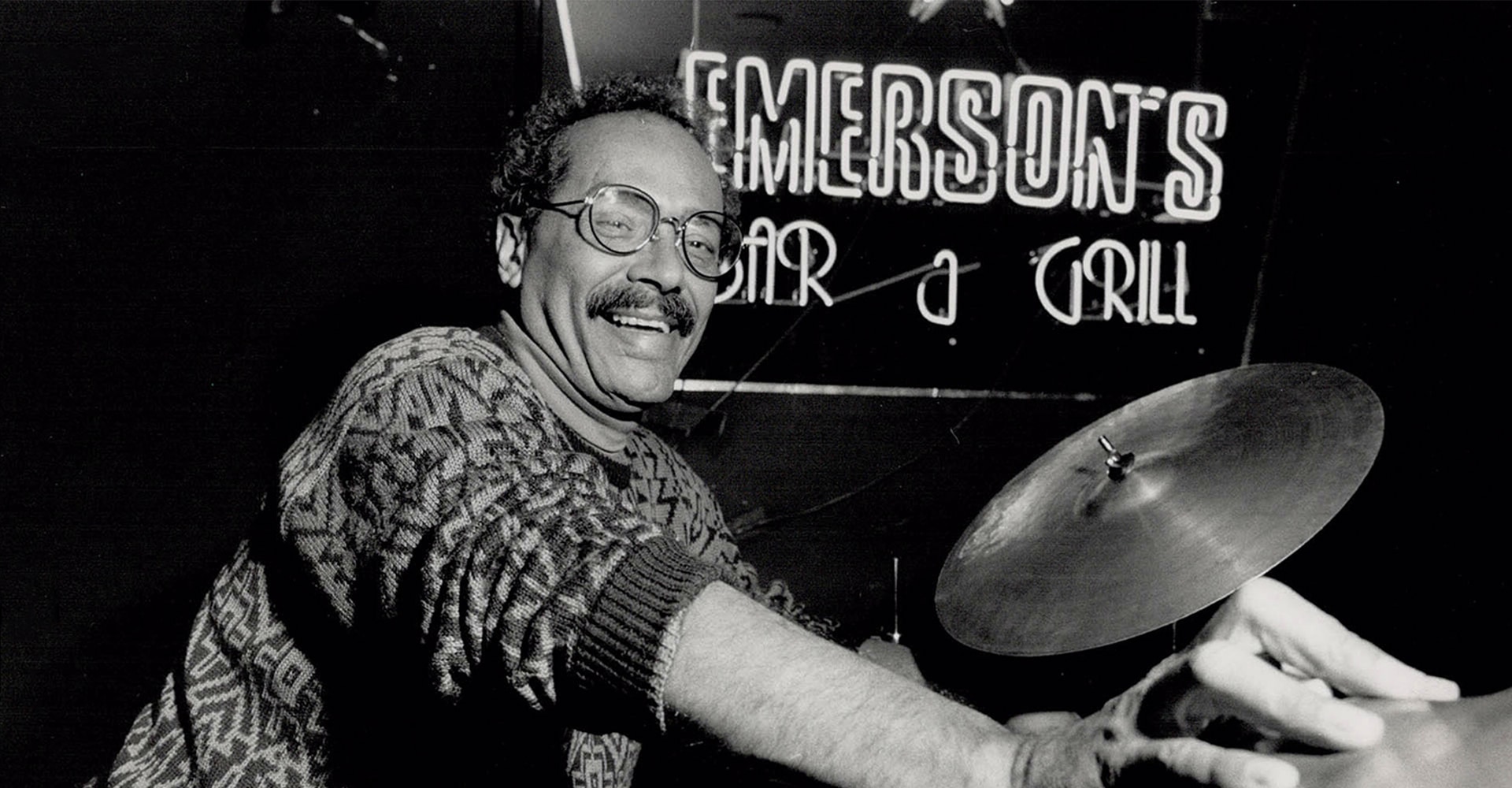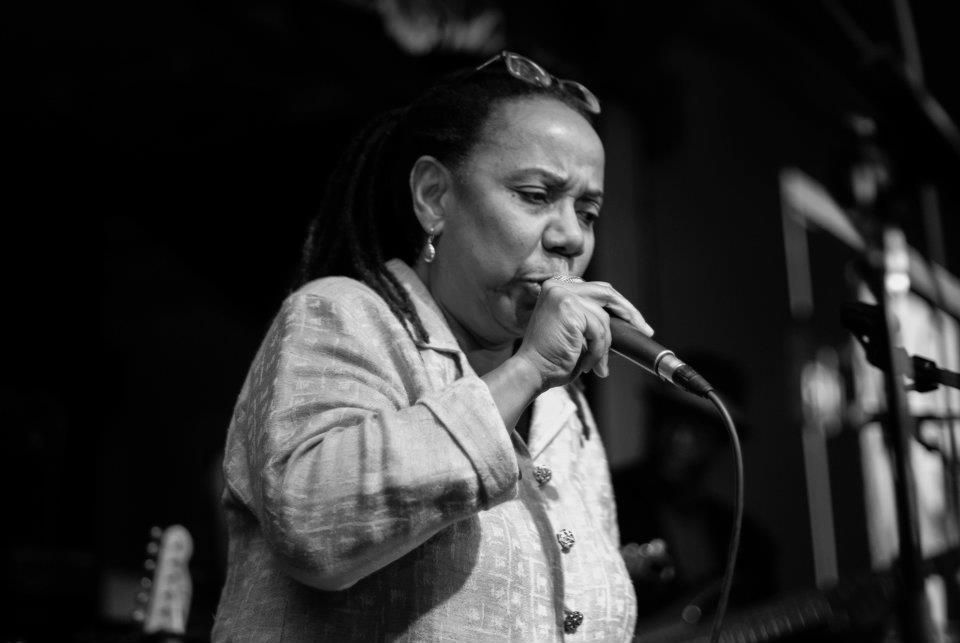
A child prodigy and talented pianist, Jackie Mittoo (1948–1990) was a foundational influence in the development of ska and reggae. One of the greatest reggae keyboardists and arrangers on the scene, Jackie introduced Canadians to the powerful beats of reggae music.
Early Life
Jackie Mittoo was born Donat Roy Edwards on March 3, 1948 in Kingston, Jamaica. Known as "Jackie" to his family, his early caregivers were primarily his maternal grandparents.
His mother worked long hours to complete medical school and later emigrated to the United States. Jackie remained in Jamaica with his grandparents.
As early as age four, Jackie found himself in front of an instrument. Jackie’s grandmother, Leila Mittoo, taught Jackie to play the piano, and later the organ when she discovered her grandson had a natural ear for music.
We would play together but most of the time the grandmother would have him around the piano. He was a brilliant student.
—Melva Harris, childhood friend of Jackie Mittoo, 2014
By the time he was ten years old, Jackie often could be found at the piano. He performed frequently at his school, but also found local gigs to play in Jamaican nightclubs. Around that same time, Jackie legally changed his last name to match that of his grandparents, the Mittoos.
He was outgoing, nothing conservative about him. When he sat down at the piano, he’s just confident. He has no doubt that he’s going to play and play good. No shyness at all. He played with energy; nothing laid back at all.
— Arnold Bertram, childhood friend of Jackie Mittoo
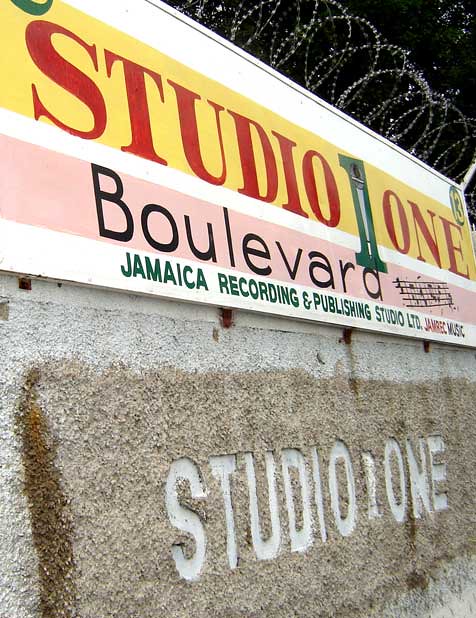
Often described as the Motown of Jamaica, Studio One helped to develop some of the major musical movements of 1960s and 1970s Jamaica, including reggae, ska, and dubstep.
Courtesy of Dubdem, licensed via Creative Commons
Studio One
Studio One, the legendary recording studio at the center of the Jamaican music scene, hired Jackie when he was only 14 years old.
As one of the yongest performers at the studio, Mittoo was paid significantly less than many of the other artists at Studio One. But there was no denying Mittoo's raw talent.
Within the span of a few years, he became organist, arranger, composer, producer, songwriter, talent scout, and musical director of Studio One. Mittoo was said to record five songs a day, five days a week while there.
The Skatalites
While at Studio One, Jackie Mittoo developed his musical style by performing in a number of bands, including the Rivals, the Sheiks, the Vagabonds, and the Vikings.
During the 1950s and early 1960s, ska became a prominent musical genre in Jamaica. The style combined various elements of calypso, jazz, and blues and is often considered a major influence on the development of reggae.
The Skatalites were among the most popular and influential of the early ska bands on the Jamaican music scene. Jackie Mittoo joined when he was still a teenager, several years younger than the rest of his bandmates. But he proved himself to be an influential band member.
This online exhibition uses third-party applications including Spotify and YouTube. Check with your organization’s web administrator if you are unable to access content from these channels in the exhibition.
Listen: Musical Communication
The Skatalites recorded their first album, Ska Authentic, at Jamaica’s Studio One in 1964. Calling themselves the creators of ska, the band toured the island. Although the Skatalites found early success with the album, the band only lasted for a year before disbanding in 1965. Several band members would revive the Skatalites in the 1970s and continue to perform today.
Listen to "Musical Communication", an early track from the Skatalites' Ska Authentic album, which helped to solidify ska as a popular musical genre in Jamaica.
Ska is often considered a predecessor and major influence on reggae music. Can you hear any similarities to reggae in the track?
A Solo Career
The downside to Jackie Mittoo’s early success was growing up too quickly. His mother and grandparents were unaware that Mittoo was skipping school to work at Studio One.
Before the age of 20, Jackie developed a drinking habit: an addiction Jackie would struggle with for the rest of his life.
Even with these speed bumps, Jackie’s career continued moving upward. Although the Skatalites disbanded in 1965, the head of Studio One, Coxsone Dodd, saw potential in Jackie and convinced him to record a solo album.
As lead musician, Mittoo released the single “Ram Jam” in 1966 with the Soul Brothers. The song was an instant hit. Success from the song earned him enough recognition to form his own band, the Jackie Mittoo Trio, in 1968.
This online exhibition uses third-party applications including Spotify and YouTube. Check with your organization’s web administrator if you are unable to access content from these channels in the exhibition.
Listen: Ram Jam
Released as a single in 1966, Jackie Mittoo’s version of the instrumental “Ram Jam” on which he played lead organ, became an early reggae classic.
Thanks to the international success of the song, Jackie toured the United Kingdom with the Studio One band, the Soul Vendors. He also continued to write and compose music at a furious pace at Studio One in Jamaica, often debuting five new pieces a week. By the late 1960s, Jackie was known as one of the most prolific ska and reggae artists in the world.
A Move To Canada
Jackie’s star was on the rise in Jamaica, yet in 1969 he boarded a plane and moved to Canada. Jackie was hesitant, but Karl Mullings, a producer who scouted Jackie to come to Canada, talked to Jackie’s grandmother, Leila Mittoo, convincing her her grandson’s future lay in the north.
Once Leila thought the move was a good idea, Jackie was quick to take his grandmother’s advice.
Toronto's Little Jamaica
With only a few clubs and record labels in Jamaica, the country’s music scene was intensely competitive. A few thousand miles north, however, the Jamaican music industry in Canada was growing rapidly. The country was also increasingly changing its attitudes on immigration. Previous immigration legislation, which placed significant restrictions and caps on non-white newcomers to Canada, were lifted in the 1960s. Jamaican immigration to Canada rose quickly.
In Toronto, newcomers from Jamaica increasingly settled in the area of Eglinton Avenue West between Oakwood Avenue and Allen Road, giving the neighbourhood the name “Little Jamaica.” Among these new immigrants were several popular reggae musicians, who began performing in Toronto. Reggae record stores and recording studios emerged alongside this new music scene.
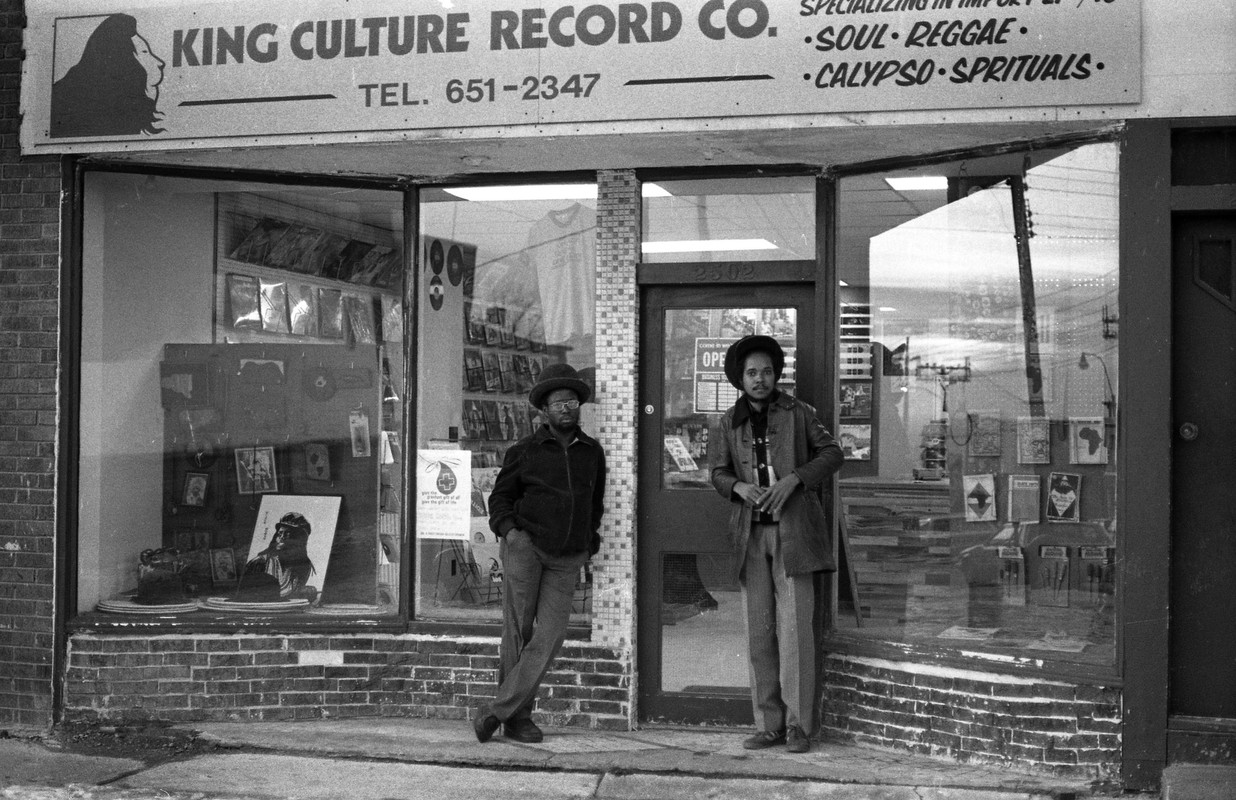
Courtesy of Beth Lesser
Canadian Reggae
Although a recognized musician in Jamaica, Jackie Mittoo landed in Toronto unknown in the Canadian music scene. Mittoo found himself needing to restart his career all over again, and took to playing Toronto area restaurants and bars.

Toronto Star, July 20, 1973
In 1971, Mittoo released his first album in Canada, Wishbone, under the small Summus label. Sales were modest and disappointing to Mittoo. Despite the growth of Jamaican communities in Toronto and throughout Canada, reggae was largely an unknown genre to much of the country. Although many Jamaicans living in Canada were devoted to reggae, fans often preferred reggae recorded in Jamaica rather than the few reggae albums made in Canada.
Listen: Wishbone
Although recorded far from Jamaica, Jackie Mittoo’s 1971 album, Wishbone, evokes the classic sounds and styles of reggae. In contrast to his earlier, more minimal work, Wishbone features lush instrumentals and full sounds, often sprinkling elements of funk and gospel into the tracks.
Reggae tracks often contain traces of melodies or wording from other previously recorded and released songs. Wishbone is said to have odes to everything from Christmas carols to Beatles references. Can you hear any snippets of familiar songs on this album?
This online exhibition uses third-party applications including Spotify and YouTube. Check with your organization’s web administrator if you are unable to access content from these channels in the exhibition.
[Reggae has] grown steadily song by song and will continue to grow that way. The name might change but the beat will last and become a standard of music.
— Jackie Mittoo
The Canadian Talent Library
Mittoo’s next two albums were produced in collaboration with Canadian Talent Library Trust (CTL), a non-for-profit that provided Canadian artists resources to record and distribute their music.
Jackie Mittoo worked as a studio musician with CTL for several years in the 1970s. With 250 Canadian radio stations and tv companies, CTL showcased Mittoo's music to a broad Canadian audience.
Reggae Magic (1972) and Let's Put It All Together (1975) were produced with the help of CTL. Mittoo believed in adapting his music to best suit his listeners. These albums incorporated orchestral pop on top of a reggae foundation, in the hopes of making the tracks more widely accessible to a broad Canadian audience.
At the time I had qualified for Canadian content because I’d already lived there for about four years. So I did one album for them called Reggae Magic. Being as it was instrumental it got favorite radio play. They didn’t have to put up with lyrics and all that, but them was still getting reggae. And so that became the favorite reggae album in Canada. This is in 1972.
Financially, it was a non-profit thing. But I could have never financed the amount of advertisement that I got from these people. It gave me good recognitions over Canada and I got good engagements because of the publicity on this project.
—Jackie Mittoo, quoted in Jabulani Tafari's "Jackie Mittoo: In Musical Overdrive", Reggae Report (1988)
A Broader Audience
Mittoo's live performances and albums helped build Mittoo's reputation in Toronto. By the mid-1970s he had regular gigs at popular Yonge Street music venues like the Boulanger and Bristol Place as well as Massey Hall.
Jackie’s success showed other Jamaican musicians there were opportunities to build their careers here in Canada. In his pursuit to find success for himself, Jackie helped to create a new music industry in Canada for Jamaicans.
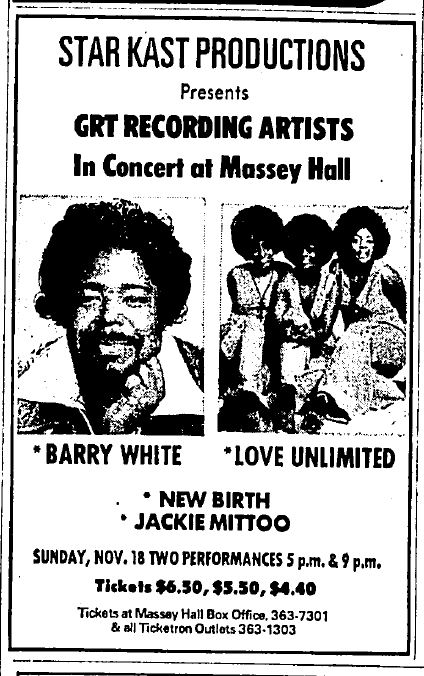
Although a prominent ska and reggae artist in Jamaica, it took years for Jackie Mittoo to establish his reputation as an artist in Canada. Although he was invited to play Massey Hall in 1973, he still didn’t receive top billing.
Toronto Star, November 11, 1973
A Jamaican-Canadian Businessman
More than a performer, Jackie Mittoo was also a versatile businessman and invested significantly to develop opportunities for reggae in Canada. He co-owned The Record Nook, one of the first reggae record stores in Canada, co-owned two Canadian distribution companies for Jamaican-made music, wrote a reggae musical that premiered off-Broadway, and mentored many Jamaican-Canadian artists.
In 1985, he became the first reggae musician inducted into the Black Music Association of Canada Hall of Fame, alongside legendary jazz pianist Oscar Peterson.
Musicians who stayed in Jamaica, who didn't leave the island, and stayed in the industry, became more popular than us. So, to survive, you had to play a little of this, a little of that.
But because of Jackie, he changed that around.
—Joe Issacs, reggae drummer
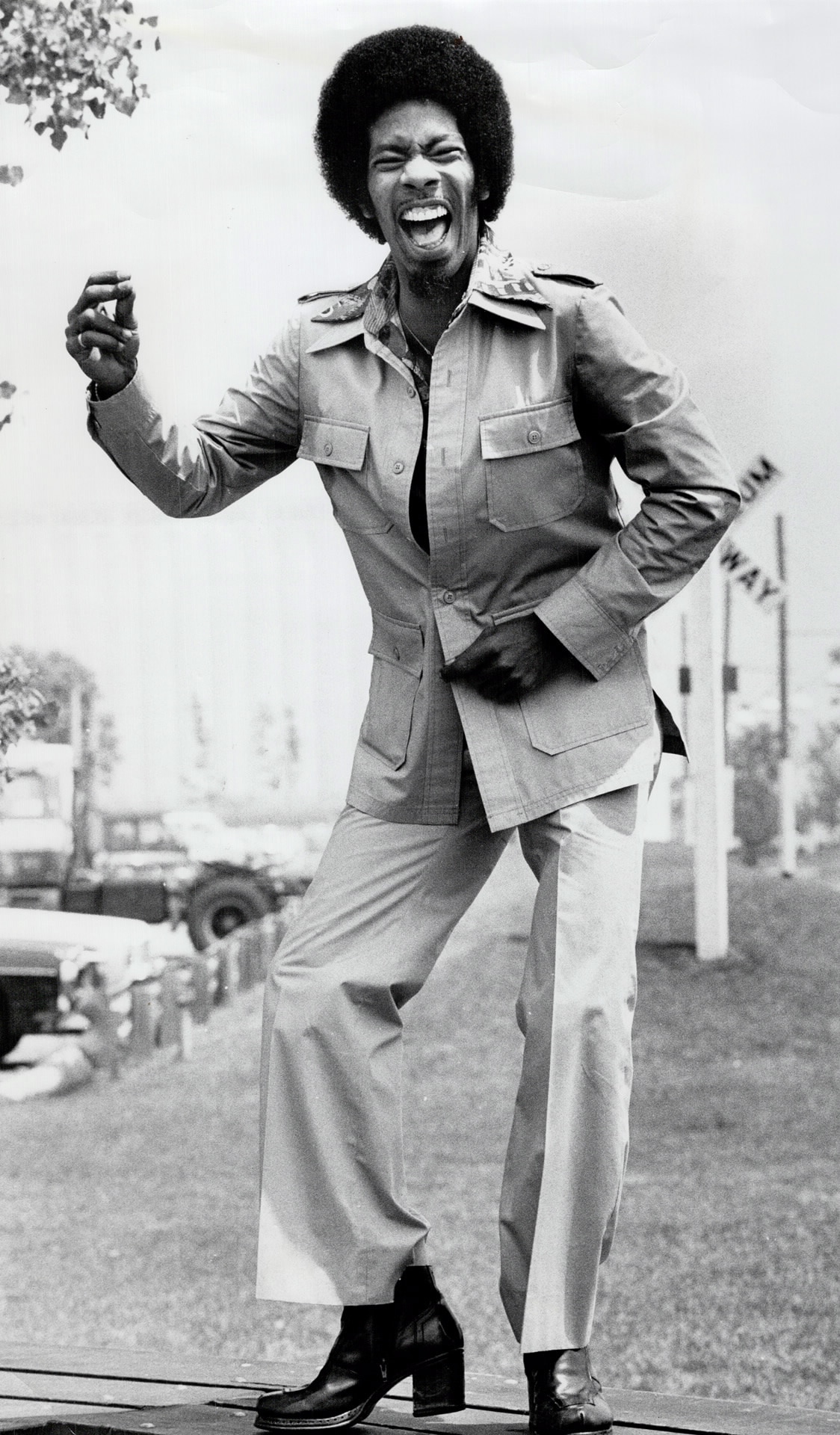
Jackie Mittoo in Toronto in 1976, just on the cusp of global fame.
Photograph by Erin Combs, courtesy of Toronto Star Photo Archives
Global Reggae Sounds
By the early 1980s, Jackie’s fame started to reach global status. Reggae music had begun to find a broader, global audience, often thanks to songs which combined pop elements with reggae tones. Mittoo worked with the British Jamaican reggae band Musical Youth to craft their international 1982 hit “Pass the Dutchie”. He also worked with British band UB40, lending his keyboard skills to several of their reggae-influenced songs.
After these hits, Jackie also was able to reunite with the band that helped start his music career several decades earlier, the Skatalites, and joined them to perform on international tours.
A Reggae Remembrance
In 1989, while on tour in Japan, Jackie Mittoo fell ill and had to return to Toronto. He passed away from cancer on December 16, 1990. Memorials for him were held in Canada, Jamaica, and the United Kingdom. He was laid to rest beside his grandmother Leila, who helped form so much of his career.
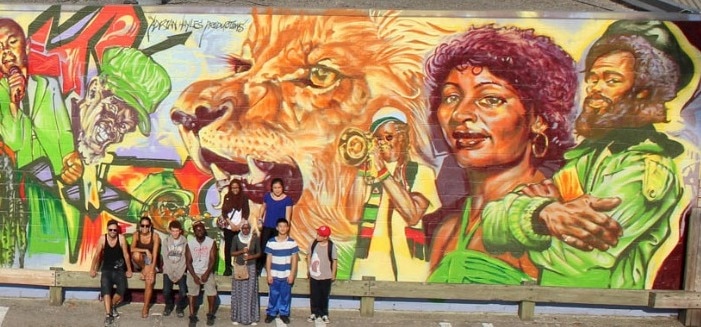
Jackie Mittoo is depicted in a mural commemorating Toronto’s Little Jamaica neighborhood, located on Reggae Lane off of Eglinton Avenue West.
Courtesy of The STEPS Initiative
Dive Deeper
Jason Wilson. King Alpha’s Song in a Strange Land: The Roots and Routes of Canadian Reggae Music. Vancouver: University of British Columbia Press, 2020.
Billroy Powell. Settling in Canada: Jamaicans Have a Story To Tell. XLIBRIS, 2014.


